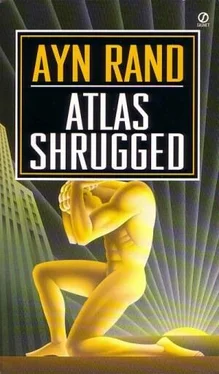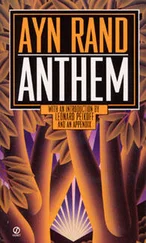They'd never contribute a penny to science! Why shouldn't they be forced? It wasn't you that I wanted to force! That gun was not aimed at the intellect! It wasn't aimed at men like you and me, only at mindless materialists! . . . Why do you look at me that way? I had no choice!
There isn't any choice except to beat them at their own game! Oh yes, it is their game, they set the rules! What do we count, the few who can think? We can only hope to get by, unnoticed—and to trick them into serving our aims! . . . Don't you know how noble a purpose it was—my vision of the future of science? Human knowledge set free of material bonds! An unlimited end unrestricted by means! I am not a traitor, John! I'm not! I was serving the cause of the mind! What I saw ahead, what I wanted, what I felt, was not to be measured in their miserable dollars! I wanted a laboratory! I needed it! What do I care where it came from or how? I could do so much! I could reach such heights!
Don't you have any pity? I wanted it! . . . What if they had to be forced? Who are they to think, anyway? Why did you teach them to rebel? It would have worked, if you hadn't withdrawn them! It would have worked, I tell you! It wouldn't be—like this! . . . Don't accuse me! We can't be guilty . . . all of us . . . for centuries. . . . We can't be so totally wrong! . . . We're not to be damned! We had no choice! There is no other way to live on earth! . . . Why don't you answer me? What are you seeing? Are you thinking of that speech you made? I don't want to think of it! It was only logic! One can't live by logic! Do you hear me? . . . Don't look at me! You're asking the impossible! Men can't exist your way! You permit no moments of weakness, you don't allow for human frailties or human feelings! What do you want of us? Rationality twenty-four hours a day, with no loophole, no rest, no escape? . . . Don't look at me, God damn you! I'm not afraid of you any longer! Do you hear me? I am not afraid! Who are you to blame me, you miserable failure? Here's where your road has brought you! Here you are, caught, helpless, under guard, to be killed by those brutes at any moment—and you dare to accuse me of being impractical! Oh yes, you're going to be killed! You won't win! You can't be allowed to win! You are the man who has to be destroyed!"
Dr, Stadler's gasp was a muffled scream, as if the immobility of the figure on the window sill had served as a silent reflector and had suddenly made him see the full meaning of his own words.
"No!" moaned Dr. Stadler, moving his head from side to side, to escape the unmoving green eyes. "No! . . . No! . . . No!"
Galt's voice had the same unbending austerity as his eyes: "You have said everything I wanted to say to you."
Dr. Stadler banged his fists against the door; when it was opened, he ran out of the room.
For three days, no one entered Galt's suite except the guards who brought his meals. Early on the evening of the fourth day, the door opened to admit Chick Morrison with two companions. Chick Morrison was dressed in dinner clothes, and his smile was nervous, but a shade more confident than usual. One of his companions was a valet. The other was a muscular man whose face seemed to clash with his tuxedo: it was a stony face with sleepy eyelids, pale, darting eyes and a prizefighter's broken nose; his skull was shaved except for a patch of faded blond curls on top; he kept his right hand in the pocket of his trousers.
"You will please dress, Mr. Galt," said Chick Morrison persuasively, pointing to the door of the bedroom, where a closet had been filled with expensive garments which Galt had not chosen to wear. "You will please put on your dinner clothes." He added, "This is an order, Mr.
Galt."
Galt walked silently into the bedroom. The three men followed. Chick Morrison sat on the edge of a chair, starting and discarding one cigarette after another. The valet went through too many too courteous motions, helping Galt to dress, handing him his shirt studs, holding his coat. The muscular man stood in a corner, his hand in his pocket. No one said a word.
"You will please co-operate, Mr. Galt," said Chick Morrison, when Galt was ready, and indicated the door with a courtly gesture of invitation to proceed.
So swiftly that no one could catch the motion of his hand, the muscular man was holding Galt's arm and pressing an invisible gun against his ribs. "Don't make any false moves," he said in an expressionless voice.
"I never do," said Galt.
Chick Morrison opened the door. The valet stayed behind. The three figures in dinner clothes walked silently down the hall to the elevator.
They remained silent in the elevator, the clicks of the flashing numbers above the door marking their downward progress.
The elevator stopped on the mezzanine floor. Two armed soldiers preceded them and two others followed, as they walked through the long, dim corridors. The corridors were deserted except for armed sentinels posted at the turns. The muscular man's right arm was linked to Galt's left; the gun remained invisible to any possible observer. Galt felt the small pressure of the muzzle against his side; the pressure was expertly maintained: not to be felt as an impediment and not to be forgotten for a moment.
The corridor led to a wide, closed doorway. The soldiers seemed to melt away into the shadows, when Chick Morrison's hand touched the doorknob. It was his hand that opened the door, but the sudden contrast of light and sound made it seem as if the door were flung open by an explosion: the light came from three hundred bulbs in the blazing chandeliers of the grand ballroom of the Wayne-Falkland Hotel; the sound was the applause of five hundred people.
Chick Morrison led the way to the speakers' table raised on a platform above the tables filling the room. The people seemed to know, without announcement, that of the two figures following him, it was the tall, slender man with the gold-copper hair that they were applauding. His face had the same quality as the voice they had heard on the radio : calm, confident—and out of reach.
The seat reserved for Galt was the place of honor in the center of the long table, with Mr. Thompson waiting for him at his right and the muscular man slipping skillfully into the seat at his left, not relinquishing his arm or the pressure of the muzzle. The jewels on the naked shoulders of women carried the glitter of the chandeliers to the shadows of the tables crowded against the distant walls; the severe black-and white of the men's figures rescued the room's style of solemnly regal luxury from the discordant slashes made by news cameras, microphones and a dormant array of television equipment. The crowd was on its feet, applauding. Mr. Thompson was smiling and watching Galt's face, with the eager, anxious look of an adult waiting for a child's reaction to a spectacularly generous gift. Galt sat facing the ovation, neither ignoring it nor responding.
"The applause you are hearing," a radio announcer was yelling into a microphone in a corner of the room, "is in greeting to John Galt, who has just taken his place at the speakers' table! Yes, my friends, John Galt in person—as those of you who can find a television set will have a chance to see for yourself in a short while!"
I must remember where I am—thought Dagny, clenching her fists under the tablecloth, in the obscurity of a side table. It was hard to maintain a sense of double reality in the presence of Galt, thirty feet away from her. She felt that no danger or pain could exist in the world so long as she could see his face—and, simultaneously, an icy terror, when she looked at those who held him in their power, when she remembered the blind irrationality of the event they were staging. She fought to keep her facial muscles rigid, not to betray herself by a smile of happiness or by a scream of panic.
Читать дальше










